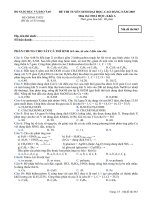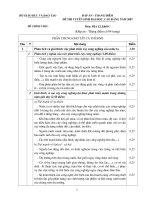Tài liệu Đề Thi Tuyển Sinh đại Học, Cao đẳng Năm 2007 pptx
Bạn đang xem bản rút gọn của tài liệu. Xem và tải ngay bản đầy đủ của tài liệu tại đây (189.62 KB, 15 trang )
Đề Thi Tuyển Sinh đại Học, Cao đẳng Năm 2007
Chọn phương án (A hoặc B, C, D) ứng với từ có trọng âm chính nhấn
vào âm tiết có vị trí khác với ba từ còn lại trong mỗi câu.
Câu 1: A. anthem B. appear C. apply D. attend
Câu 2: A. prevent B. remote C. recent D. receive
Câu 3: A. scenery B. atmosphere C. festival D. location
Câu 4: A. photographer B. considerate C. circumstance D. community
Câu 5: A. geography B. endanger C. opposite D. geometry
Đọc kỹ đoạn văn sau và chọn phương án đúng (A hoặc B, C, D) cho mỗi chỗ
trống từ 6 đến 15.
The wind controls our planet's weather and climate. But how much do we
understand about this complex force (6)______ can kill and spread fear?
On the night of October 15, 1987, the south of England was (7)_____ by
strong winds. Gusts of over 130 km/h (8)______ through the region.
Nineteen people were killed, £1.5-billion worth of damage was (9) ______
and 19 million trees were blown down in just a few hours.
Although people thought of this (10)_____ a hurricane, the winds of 1987
were only a (11)______ 7 storm. They remain far better known than the
much more serious storms of January 25, 1990, (12)______ most of Britain
was hit by daytime winds of up to 173 km/h. On this occasion, 47 people
were killed, even though, (13)______ in 1987, the weather forecasters issued
accurate warnings.
Extreme weather events such as these are dramatic (14)______ of the power
of the wind. It is one part of the weather that people generally do not give a
second (15)______ to, but across the world the wind plays a crucial role in
people's lives.
Câu 6: A. what B. when C. which D. where
Câu 7: A. attacked B. beaten C. besieged D. struck
Câu 8: A. spread B. blew C. ran D. flew
Câu 9: A. paid B. resulted C. caused D. created
Câu 10: A. unlike B. same as C. as D. like
Câu 11: A. length B. force C. strength D. power
Câu 12: A. when B. until C. while D. why
Câu 13: A. like B. unlike C. such as D. when
Câu 14: A. remains B. recalls C. reminders D. memories
Câu 15: A. think B. help C. thought D. care
Đọc kỹ đoạn văn sau và chọn phương án đúng (A hoặc B, C, D) cho mỗi câu
từ 16 đến 25.
Millions of people are using cellphones today. In many places, it is actually
considered unusual not to use one. In many
countries, cellphones are very popular with young people. They find that the
phones are more than a means of
communication - having a mobile phone shows that they are cool and
connected.
The explosion in mobile phone use around the world has made some health
professionals worried. Some doctors are
concerned that in the future many people may suffer health problems from
the use of mobile phones. In England, there has
been a serious debate about this issue. Mobile phone companies are worried
about the negative publicity of such ideas.
They say that there is no proof that mobile phones are bad for your health.
On the other hand, medical studies have shown changes in the brain cells of
some people who use mobile phones.
Signs of change in the tissues of the brain and head can be detected with
modern scanning equipment. In one case, a
traveling salesman had to retire at young age because of serious memory
loss. He couldn't remember even simple tasks.
He would often forget the name of his own son. This man used to talk on his
mobile phone for about six hours a day, every
day of his working week, for a couple of years. His family doctor blamed his
mobile phone use, but his employer's doctor
didn't agree.
What is it that makes mobile phones potentially harmful? The answer is
radiation. High-tech machines can detect very
small amounts of radiation from mobile phones. Mobile phone companies
agree that there is some radiation, but they say
the amount is too small to worry about.
As the discussion about their safety continues, it appears that it's best to use
mobile phones less often. Use your
regular phone if you want to talk for a long time. Use your mobile phone
only when you really need it. Mobile phones can
be very useful and convenient, especially in emergencies. In the future,
mobile phones may have a warning label that says
they are bad for your health. So for now, it's wise not to use your mobile
phone too often.
Trang 2/4 - Mã đề thi 598
Câu 16: According to the passage, cellphones are especially popular with
young people because ______.
A. they make them look more stylish B. they keep the users alert all the time
C. they cannot be replaced by regular phones D. they are indispensable in
everyday communications
Câu 17: The changes possibly caused by the cellphones are mainly
concerned with ______.
A. the smallest units of the brain B. the mobility of the mind and the body
C. the resident memory D. the arteries of the brain
Câu 18: The word "means" in the passage most closely means ______.
A. “meanings” B. “expression” C. “transmission” D. “method”
Câu 19: The word "potentially" in the passage most closely means ______.
A. “certainly” B. “obviously” C. “privately” D. “possibly”
Câu 20: "Negative publicity" in the passage most likely means ______.
A. widespread opinion about bad effects of cellphones B. information on the
lethal effects of cellphones
C. the negative public use of cellphones D. poor ideas about the effects of
cellphones
Câu 21: Doctors have tentatively concluded that cellphones may ________.
A. cause some mental malfunction B. change their users’ temperament
C. change their users’ social behaviours D. damage their users’ emotions
Câu 22: The man mentioned in the passage, who used his cellphone too
often, ______.
A. had a problem with memory B. abandoned his family
C. suffered serious loss of mental ability D. could no longer think lucidly
Câu 23: According to the passage, what makes mobile phones potentially
harmful is ______.
A. their radiant light B. their raiding power
C. their power of attraction D. their invisible rays
Câu 24: According to the writer, people should ______.
A. keep off mobile phones regularly B. never use mobile phones in all cases
C. only use mobile phones in medical emergencies D. only use mobile
phones in urgent cases
Câu 25: The most suitable title for the passage could be ______.
A. “Technological Innovations and Their Price” B. “The Way Mobile
Phones Work”
C. “The Reasons Why Mobile Phones Are Popular” D. “Mobile Phones: A
Must of Our Time”
Chọn phương án đúng (A hoặc B, C, D) để hoàn thành mỗi câu sau.
Câu 26: The building has a smoke detector ______ any fires can be detected
immediately.
A. so that B. if C. such as D. as if
Câu 27: I just took it ______ that he’d always be available.
A. into consideration B. easy C. into account D. for granted
Câu 28: If she ______ sick, she would have gone out with me to the party.
A. wasn’t B. hadn’t been C. hasn’t been D. weren’t
Câu 29: Ensure there is at least a 3cm space ______ allow adequate
ventilation.
A. so that B. with a view to C. in view of D. so as to
Câu 30: She nearly lost her own life ______ attempting to save the child
from drowning.
A. at B. for C. with D. in
Câu 31: My father hasn't had much ______ with my family since he moved
to New York.
A. meeting B. connection C. business D. contact
Câu 32: While southern California is densely populated, ______ live in the
northern part of the state.
A. many people B. few people C. a few of people D. a number people
Câu 33: Anne persisted ______ her search for the truth about what had
happened.
A. at B. on C. in D. about
Câu 34: Why don’t you ask the man where ______ to stay?
A. he would rather B. would he like C. he feels like D. he would like
Câu 35: Prizes are awarded ______ the number of points scored.
A. because of B. resulting in C. according to D. adding up
Câu 36: The old houses were ______ down to make way for a block of flats.
A. banged B. put C. knocked D. hit
Câu 37: Nowadays children would prefer history ______ in more practical
ways.
A. to teach B. to be taught C. teach D. be taught









